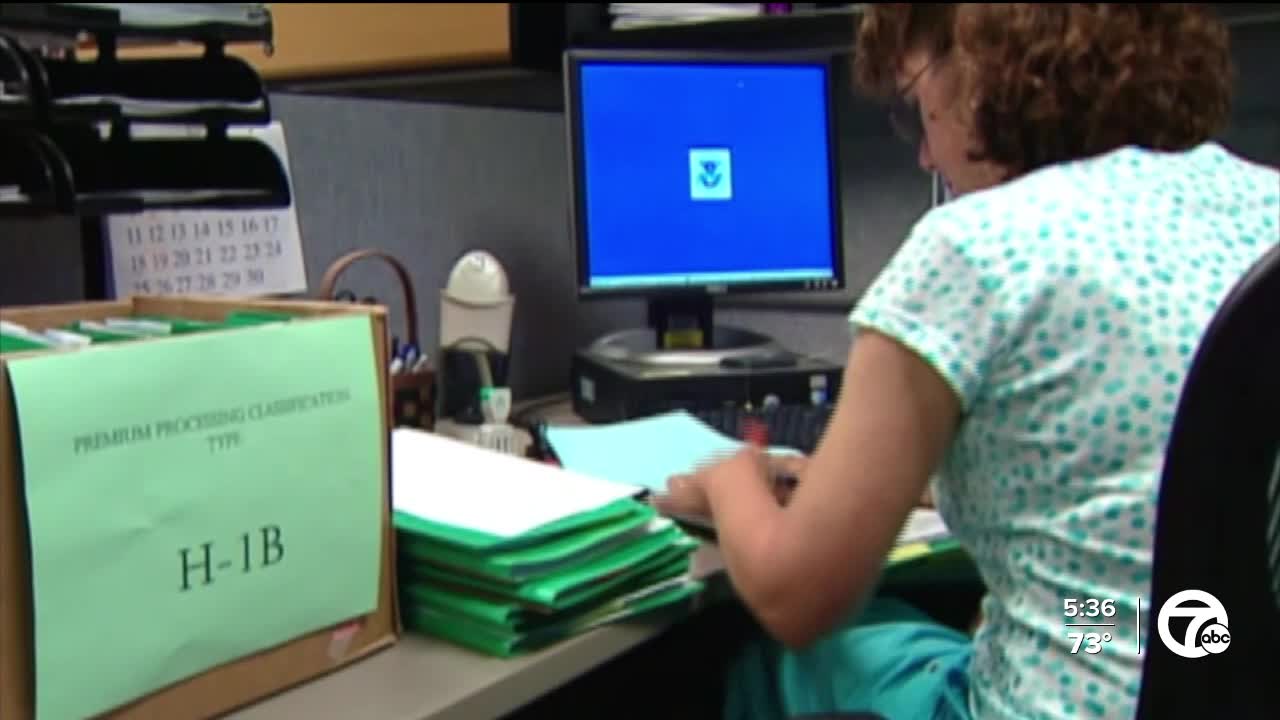ANN ARBOR, Mich. (WXYZ) — A new $100,000 application fee for H-1B visas has international students and employers grappling with significant changes to a program that has long served as a pathway for foreign workers to build careers in the United States.
Watch Faraz Javed's video report:
President Trump signed the proclamation last Friday, implementing the fee starting this week for new H-1B visa applications. The White House says the measure will protect American jobs, but critics worry about long-term economic consequences.
The fee represents a dramatic increase from the previous cost of approximately $10,000, raising expenses for U.S. companies by more than 11-fold when hiring foreign workers through the H-1B program.
Students react with mixed emotions
At the University of Michigan, international students expressed varying reactions to the policy change.
"It sounds really tough to be in that position," said Will Militzer, an Ann Arbor student.

However, U of M senior Daisy Monroe sees potential benefits for American workers.
"So I feel for them, but I have to put myself first to be like, this kind of helps me with more opportunities," Monroe said.

Militzer emphasized merit-based hiring regardless of nationality.
"People should hire based on who would do the best at the job. So if somebody's more qualified who lives abroad, I think they should get it," Militzer said.
Immigration attorney warns of brain drain
Immigration attorney Marcel Miclea said the new rule doesn't apply to current H-1B holders or renewals, but he predicts broader consequences.
"International students will think twice about coming to the U.S. to study. They will maybe look elsewhere, which effectively would mean a brain drain in the U.S.," Miclea said.
WEB EXTRA: Immigration attorney at Palmer Rey Marcel Miclea explains immigration changes
The Economic Policy Institute reports about 600,000 H-1B workers are employed by 50,000 U.S. companies. USCIS data shows roughly 70% of H-1B workers first came to America as international students.
"A lot of innovation has been done because of these talented workers. So I see, on the long term, the U.S. will be losing," Miclea said.
Supporters cite job creation potential
Michigan Franchise Owners Association president Ali Haider supports President Trump's decision, citing potential job creation.
"There's a debate that it will actually generate 3 million local jobs," Haider said.
U-M international student Suzane Fernandes, who has time before seeking full-time work, believes the change could benefit qualified candidates.
"Because of the changes, probably there'll be less people who are trying to apply for jobs, and there'll be a better chance for people who are actually deserving," Fernandes said.

Monroe agreed that the higher fee could help exceptional candidates stand out.
"I think the $100,000 will make it to where people who actually have the skills that will be considered exceptional, they will stand out even more," Monroe said.
Addressing program abuse
Haider said the change could help curb abuse within the H-1B system. The Economic Policy Institute estimates the H-1B program has cost workers at least $95 million in underpaid wages. In 2022, big tech firms hired 34,000 H-1B workers while laying off over 85,000 Americans.
"We have a lot of American people who don't have a job or a good enough job to make a living," Haider said.
He emphasized the importance of domestic education and training.
"We should educate our own kids here in America so they can have jobs who are more into tech field and for more technical education," Haider said.
Mixed long-term outlook
Miclea acknowledged potential short-term benefits for American workers but expressed concern about long-term consequences.
"So I think, on the short term, the US worker might see an increase, a slight increase in wages because of some fraud that exists in the program. Long term, I think the consequences are vast and it will impact companies, universities," Miclea said.
The new policy includes a national interest exemption at the discretion of the Secretary of Homeland Security for certain workers or industries. The restriction is set to expire in 12 months unless extended.
—————————————————
This story was reported on-air by a journalist and has been converted to this platform with the assistance of AI. Our editorial team verifies all reporting on all platforms for fairness and accuracy.




